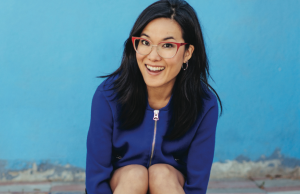EMERGING FEMINISMS, The Model Minority Myth: “Performing” Asian
By Angela Kong

LTAB was founded over a decade ago by the group Young Chicago Authors (YCA). It is considered the largest youth poetry competition.
“What’s your major?”
They ask me.
I pause.
I always pause.
I’ve never been the type to speak up in class. Instead, silence usually spoke for me. Sometimes, silence feels like a double edged sword – staying quiet often allows others to assume and place Asian stereotypes on me, that I’m just polite and have no opinions, but too often it also allowed others to tell me who I was. Growing up, being “myself” meant being anything but the Asian stereotypes – I refused to learn Chinese, refused to hang out with the other Asian kids, refused to learn how to properly use chopsticks – it is only now that I wonder if I was doing all those things so I would attempt to represent a different type of Asian, in hopes that I wouldn’t be stereotyped. Whenever classmates would say I’m smart, I always retorted to them, “Is it because I’m Asian?” I always retorted in anger, challenging them to their stereotypes, but never asking myself that same question: “Is it because I’m Asian?”
Growing up as a model minority wasn’t easy; it was difficult because I always felt obligated to be in the advanced classes, and if I wasn’t, then clearly I was doing something wrong. According to Carolyn Chen, “When [Asian Americans] succeed, their peers chalk it up to “being Asian.” They are too smart and hard-working for their own good.” My dad always told me that white people could work 80%, but Asians had to work 110% for the same recognition. As Robert Chang claims:
“At its surface, the label ‘model minority’ seems like a compliment. However, once one moves beyond this complimentary façade, one can see the label for what it is – a tool of oppression which works a dual harm by (1) denying the existence of present-day discrimination against Asian Americans and the present-day effects of past discrimination, and (2) legitimizing the oppression of other racial minorities and poor whites.”
It took me years to realize what being a “model minority” meant. I remember feeling that no matter how much effort I put into something, my hard work would always be seen as “not enough,” because it couldn’t live up to the expectations that others placed on my race. I did anything in my power to disprove them – I would proudly tell others that I failed the math test because then at least it would mean that I wasn’t as “Asian” as they expected me to be. And yet, even when I would tell the other Asians I failed the test, they didn’t believe me. “Do you mean you Asian failed or you failed failed?” I played along with the joke too though, I said I was “bad at math” but what I meant was I got a C+ in Calculus. All of the Asians who were not in the advanced math classes were considered to be in “dumb math.” As Jesse Washington notes, “The way it works, the critics believe, is that Asian-Americans are evaluated not as individuals, but against the thousands of other ultra-achieving Asians who are stereotyped as boring academic robots.” It wasn’t until I was rejected from four UCs (University of California) that I understood my dad’s comment about hard work –my effort would never be enough unless it was better than everyone else’s – 110%. But lucky for me, private liberal arts colleges would accept me because they needed diversity. I ended up committing to Colorado College, a small liberal arts school in Colorado Springs, where 70% of the student body is white.
Societal definitions of success for Asians are seen as becoming either a doctor, engineer, or accountant, and as a result, going to a liberal arts college made me feel like the odd (Asian) one out. To throw expectations off even further, I decided to major in Gender Studies. Being a Chinese American woman majoring in Gender Studies sounds like a walking contradiction: being Chinese I should avoid conflict and keep my mouth shut, being American I should be comfortable having an opinion about everything, but being a woman I should be polite, and being a Gender Studies major – well, I should be extremely smart, opinionated, and enjoy raising my hand in class, none of which I can completely embody at one time. I’ve gotten mixed reactions about my major, from: “You can’t be a feminist! Look at you, you’re not fierce!” to “Oh wow, that’s really awesome!”
My mother wishes I would become an accountant. One time, while she was making small talk with a random college aged Asian American girl, she inquired about her major – she responded with “accounting.” My mother nodded and smiled approvingly, “Ah yes, that’s good, stable job, good pay.” Another time, she asked me if there’s any way I could change my major, even suggesting that I take more time in college so I could do anything but a Gender Studies Major. But her asking me to change my major was almost as if she was asking me to change myself (granted, she didn’t know this) – to go back to being ignorant and angry at my very existence. Needless to say, she left me speechless – she left me silent.
It wasn’t until my sophomore year in college when I started analyzing my Asian American identity – a senior wanted to interview me for her thesis on emotion in Asian American families. The topic
lingered in my mind long after we met. I spent the following semester studying in Chicago, where I constantly explored the politics of race. I grew up in the San Francisco Bay Area, where about 20% of the population was Asian, and I remember feeling out of place living in the Midwest because only 4% of Chicago was Asian. The people in my program were quite ignorant, which affected the way I would speak, or not speak, and how I acted. A white classmate once said to me, “Angela, you’re like, a character, you’re like not even a person!” You can see how this made me hesitant to cook with soy sauce because I didn’t want my “performance” of being Asian to influence the way they would view or treat other Asians in the future. When I attended the final round of the largest youth poetry competition in the world, Louder Than a Bomb, I felt like a bolt of lightning struck me that night watching the amazing performances; it inspired me to seriously ask myself that same question I asked others growing up – “Is it because I’m Asian?” – through writing my own slam poetry. I’ve written poetry before, but it was in performing my poetry where I learned to own and be confident in my words, and learned to not be afraid in speaking up. I didn’t feel the need to live up to a certain stereotype or to perform “Asian” – I just needed to be true and genuine to my own voice. As comedian Ali Wong states, “…whatever job you do, if you do
it well with a unique point of view that makes people pay attention to your voice, it will influence Asian-American studies by nature of you being Asian American.” For the independent project component of my program, I explored this identity through the usage of slam poetry and photography. By the end of the semester, I performed my poem “What’s your major?” in front of my classmates.
After Chicago, I spent my junior year studying Chinese abroad in Beijing. Going to China and “finding my roots,” as cliché as the journey sounds, allowed me to accept parts of myself and parts of my identity that I refused to accept for years. For once, I didn’t feel like I had to “perform” my Asian or Chinese identity. I could spend days scarfing down Chinese food without feeling like the outsider, I could learn how to speak Chinese and “fit in,” and I could be dumb, as ridiculous as that sounds. I didn’t have to be the smart one all the time. I didn’t feel like I was performing (or not performing) this aspect of my identity – I could just be myself. In talking about his identity, Patrick S., “I would suspect that the real process of getting to know your identity involves as much an element of creation as it does of discovery.” I learned how to survive in a foreign country on my own, with the help of my friends and teachers, of course. I got a glimpse into my parent’s struggle of being immigrants, and learned to love and empathize with them in a completely different way. And I finally learned to speak in Chinese. When I came back from China, I wrote a poem titled “A love letter to Beijing,” but it felt more like writing a love letter to myself. In Chicago, where I first started spoken word, my poems came from a place of anger for all the expectations that people placed on my “Asian-ness.” But poems from my time in China sounded more like forgiveness, like acceptance, and being ok with the fact that I hold my chopsticks like a pencil – almost as if my writing is intertwined with my identity (or maybe I just refuse to learn because I’m lazy. And if I do learn, then I can’t use that line in my poetry).
Accepting and embracing my identity isn’t just a matter of me entertaining a “metaphysical” theory or an abstract concept that I read from one of my feminist texts – it’s allowing myself to recognize that accepting my multifaceted identity is fundamental to me becoming and being a better feminist. I don’t need to carry all the weight of stereotypes, and actively reinforce or disprove them, because being honest and genuine with myself and taking up space is already a statement in itself. One of the most important aspects of exploring my identities was about how I approach other Asians and/or Asian Americans about their respective experiences and discovering similarities we may have. In my most recent conversation with my housemate, who’s half Japanese, she asked me whether or not I have a lot of Asian friends, which eventually led to my study abroad experience. Initially, she was hesitant in regards to where she may want to study abroad, remarking how she often went to Japan as a kid to see her mom’s family and felt it was too familiar for her. I shared my experience of going to China, how it was important and empowering for me to explore my identity. Afterwards, I let her read my book, “Balancing Two Worlds: Asian American College Students Tell Their Life Stories,” and after she spoke like the wind was knocked out of her voice. She said, with complete clarity, “Wow, I think I want to go to Japan for my study abroad now, I think it would be really good for me.” Needless to say, I had quite a difficult time containing my excitement and my elation – it was ME who inspired her to explore this aspect of herself. As Chang writes, “…storytelling promotes solidarity. As we tell our stories and as we hear other people’s stories, we realize that we are not alone.” From my own experience, I can help others share and explore their own identities by creating the space for these stories to be heard.
I still struggle with my silence. But I’m growing less comfortable with being silent. I’m often at wits with myself, frequently asking, “Why does this matter? Why does talking about identity and being able to relate to others and have others relate to me matter so much in the grand scheme of things?” Making my voice heard, as an Asian, speaks volumes about the importance of representation and inclusion of personal narrative. As Chang, “…despite our differences, all Asian Americans share certain common experiences which connect and unify us. What follows, then, is a story of the past. It is also a story of the present. I tell it now because I do not want it to be a story of the future.” I am continually inspired by other Asians and Asian Americans and find strength in their voices, which helps me become more comfortable in embracing my own. Ignoring my identit(ies) would give others the power to define and tell me who I am. But gender studies taught me that my voice matters, that despite all societal expectations, I’m still important. And even though I still may not be the kind of student who raises their hand in class, in the end that isn’t what defines my voice. Speaking about and sharing this aspect of myself will never become any easier, but it has and will make me stronger. My one voice isn’t enough, but my one voice is still important and has the power to make a difference. In fact, maybe the way I respond says more than my answer – “Speak the truth, even if voice shakes.”
“What’s your major?”
They ask me.
I pause,
I always pause,
but this time I speak.
“Gender Studies.”
 Angela Kong is currently a senior majoring in Feminist and Gender Studies at Colorado College. She is a passionate adventurer and loves exploring and learning about the world outside of her comfort zone. She is currently working on a thesis about Asian American identity. You can check out some of her photography and videos at her website: http://angelamkong.wi
Angela Kong is currently a senior majoring in Feminist and Gender Studies at Colorado College. She is a passionate adventurer and loves exploring and learning about the world outside of her comfort zone. She is currently working on a thesis about Asian American identity. You can check out some of her photography and videos at her website: http://angelamkong.wi







0 comments